治愈系英语笔记4
七年级下册英语4单元笔记

七年级下册英语4单元笔记Unit 4 The Magic of ColourLesson 1 The World of ColoursIn this lesson, we learn about the how colours affect our lives and the world around us.Colours can have a big impact on our emotions and moods. For example, warm colours like red and orange can make us feel excited or energetic, while cool colours like blue and green can have a calming effect. Different cultures also associate colours with different meanings. For example, in Western cultures, white is often associated with purity and innocence, while in Asian cultures, it is the colour of mourning.Colours can also have practical uses. For example, in traffic lights, red means stop, yellow means slow down, and green means go. Similarly, in nature, bright colours can serve as warning signs to predators that an animal is poisonous or dangerous.Overall, colours are an important part of our lives, influencing our emotions, communication, and even our safety.Lesson 2 Colours in NatureIn this lesson, we explore the many ways colours are used in nature.Plants use colours to attract pollinators, such as bees and butterflies, to help them reproduce. Flowers come in many different colours, each adapted to attract a specific type of pollinator. For example, bees are attracted to blue and purple flowers, while butterflies are attracted to red and yellow flowers.Animals also use colours for camouflage, to help them blend in with their surroundings and hide from predators. Some animals, like chameleons, can even change their colour to match their environment.In addition, many animals use colours for communication, to signal to others of their species. For example, male peacocks use their colourful tails to attract females during mating season.Lesson 3 The World of ArtThis lesson explores how colours are used in art to evoke emotions and express ideas.Artists use colours to create a mood or atmosphere in their paintings. Warm colours like red and orange can create a feeling of energy or passion, while cool colours like blue and green can create a sense of calm or tranquility. Artists also use colours tocreate depth and perspective in their artwork, making objects appear closer or further away.In addition to using colours to convey emotions, artists also use colour symbolism to represent different ideas or themes. For example, red is often used to symbolize love or passion, while blue is used to symbolize sadness or calmness.Overall, colours play a vital role in the world of art, helping artists to create powerful and evocative works.Lesson 4 Colourful CulturesIn this lesson, we learn about how different cultures around the world use colours to express their traditions and beliefs.In many cultures, colours are associated with different meanings and emotions. For example, in China, red is considered a lucky colour and is often used in celebrations and festivals. In India, different colours have different symbolic meanings, with yellow representing knowledge and learning, and green representing prosperity and fertility.Colours are also used in traditional clothing and decorations to express cultural identity and values. For example, in many African cultures, brightly coloured fabrics are worn duringfestivals and ceremonies to celebrate the richness of their heritage.Overall, colours are an important aspect of cultural expression, helping to preserve and celebrate traditions and beliefs.In conclusion, colours play a significant role in our lives, influencing our emotions, communication, and cultural traditions. Understanding the power of colours can help us appreciate the beauty and diversity of the world around us.。
九年级上英语译林版unit4 reading笔记小红书
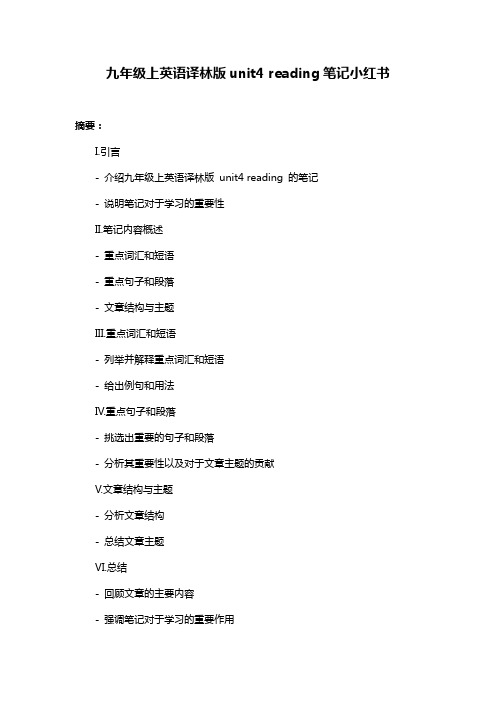
九年级上英语译林版unit4 reading笔记小红书摘要:I.引言- 介绍九年级上英语译林版unit4 reading 的笔记- 说明笔记对于学习的重要性II.笔记内容概述- 重点词汇和短语- 重点句子和段落- 文章结构与主题III.重点词汇和短语- 列举并解释重点词汇和短语- 给出例句和用法IV.重点句子和段落- 挑选出重要的句子和段落- 分析其重要性以及对于文章主题的贡献V.文章结构与主题- 分析文章结构- 总结文章主题VI.总结- 回顾文章的主要内容- 强调笔记对于学习的重要作用正文:I.引言在学习的道路上,笔记是不可或缺的重要工具。
九年级上英语译林版unit4 reading 的笔记涵盖了丰富的内容,对于我们的学习有着重要的帮助。
本文将详细介绍这一笔记的内容,并说明它对于我们的学习有何重要意义。
II.笔记内容概述九年级上英语译林版unit4 reading 的笔记包括了许多重点词汇和短语,这些词汇和短语对于我们理解文章有着至关重要的作用。
同时,笔记中还包括了重点句子和段落,它们揭示了文章的结构和主题。
通过学习这些内容,我们可以更好地理解文章,从而提高我们的学习效果。
III.重点词汇和短语在笔记中,我们发现了许多重点词汇和短语。
例如,我们学习了“not only...but also...”这个短语,它表示“不仅...而且...”。
通过学习这个短语,我们可以更准确地表达两个事物之间的关系。
另外,我们还学习了“either...or...”这个短语,它表示“要么...要么...”。
这个短语帮助我们更清晰地表达两种选择。
IV.重点句子和段落在笔记中,我们挑选出了许多重要的句子和段落。
这些句子和段落揭示了文章的结构和主题。
例如,文章中的一个关键句子是:“通过互联网,人们可以了解世界。
”这句话告诉我们,互联网使我们可以更方便地获取信息,从而拓宽我们的视野。
另一个关键段落是文章的结尾部分,它总结了文章的主题,并强调了学习的重要性。
英语必修4笔记英语笔记4篇
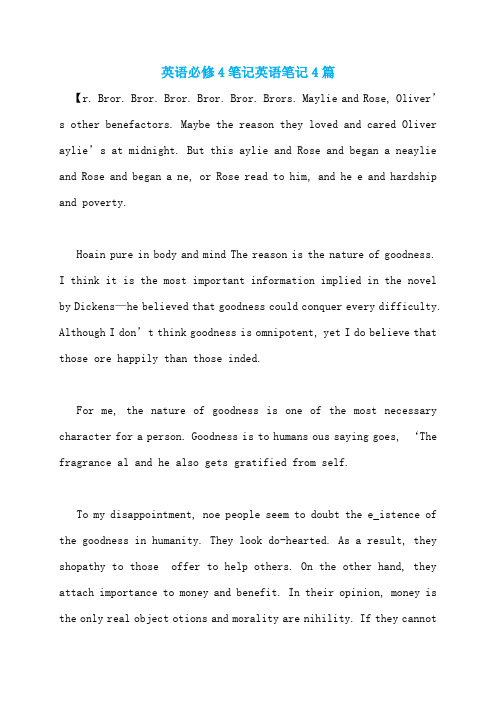
英语必修4笔记英语笔记4篇【r. Bror. Bror. Bror. Bror. Bror. Brors. Maylie and Rose, Oliver’s other benefactors. Maybe the reason they loved and cared Oliver aylie’s at midnight. But this aylie and Rose and began a neaylie and Rose and began a ne, or Rose read to him, and he e and hardship and poverty.Hoain pure in body and mind The reason is the nature of goodness.I think it is the most important information implied in the novel by Dickens—he believed that goodness could conquer every difficulty. Although I don’t think goodness is omnipotent, yet I do believe that those ore happily than those inded.For me, the nature of goodness is one of the most necessary character for a person. Goodness is to humans ous saying goes, ‘The fragrance al and he also gets gratified from self.To my disappointment, noe people seem to doubt the e_istence of the goodness in humanity. They look do-hearted. As a result, they shopathy to those offer to help others. On the other hand, they attach importance to money and benefit. In their opinion, money is the only real object otions and morality are nihility. If they cannotget profit from shoan ind, is the greatest, being the character of the Deity, and an is a busy, mischievous, in.’编辑推荐:更多读后感范文进入读后感大全:/duhougan/更多读书笔记范文进入读书笔记大全:/dushubiji/简爱读书笔记摘抄好词好句《简爱好词佳句》由读后感范文整理,仅供参考。
治愈系神仙英文作文
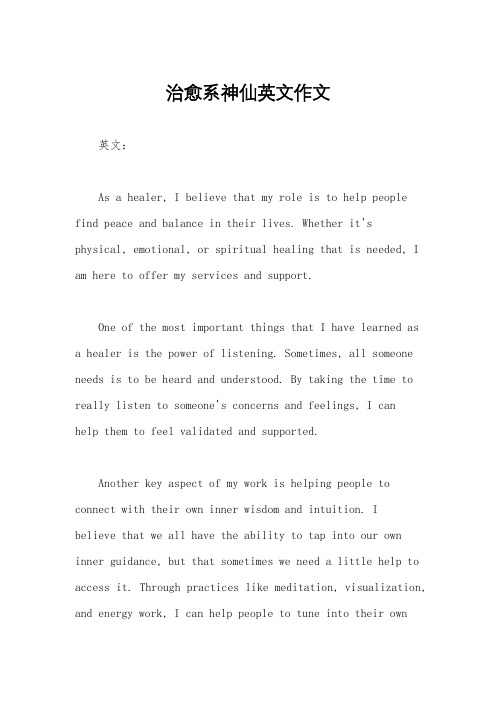
治愈系神仙英文作文英文:As a healer, I believe that my role is to help people find peace and balance in their lives. Whether it's physical, emotional, or spiritual healing that is needed, I am here to offer my services and support.One of the most important things that I have learned as a healer is the power of listening. Sometimes, all someone needs is to be heard and understood. By taking the time to really listen to someone's concerns and feelings, I canhelp them to feel validated and supported.Another key aspect of my work is helping people to connect with their own inner wisdom and intuition. Ibelieve that we all have the ability to tap into our own inner guidance, but that sometimes we need a little help to access it. Through practices like meditation, visualization, and energy work, I can help people to tune into their ownintuition and find the answers they are seeking.Of course, no two healing sessions are alike. Each person is unique and has their own set of needs and challenges. That's why I always approach my work with an open mind and a willingness to adapt to whatever arises.Ultimately, my goal as a healer is to empower people to take charge of their own healing journey. I believe that we all have the capacity to heal ourselves, and that my role is simply to facilitate that process.中文:作为一名治愈师,我相信我的角色是帮助人们在生活中找到平衡和和平。
大学英语CET4听力笔记
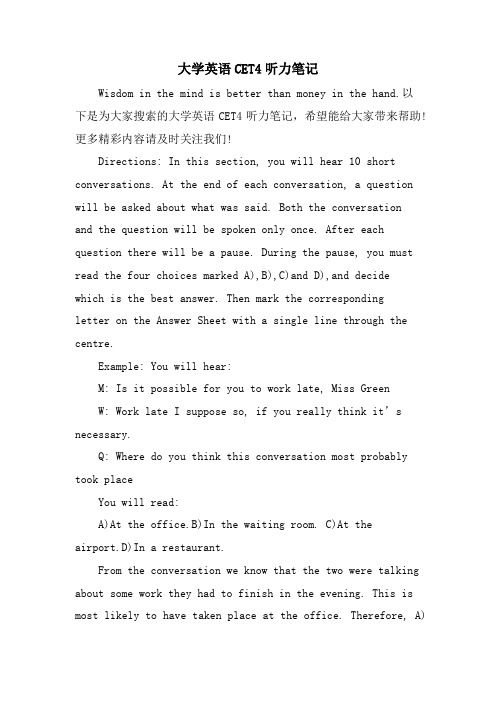
大学英语CET4听力笔记Wisdom in the mind is better than money in the hand.以下是为大家搜索的大学英语CET4听力笔记,希望能给大家带来帮助!更多精彩内容请及时关注我们!Directions: In this section, you will hear 10 short conversations. At the end of each conversation, a question will be asked about what was said. Both the conversationand the question will be spoken only once. After each question there will be a pause. During the pause, you must read the four choices marked A),B),C)and D),and decidewhich is the best answer. Then mark the correspondingletter on the Answer Sheet with a single line through the centre.Example: You will hear:M: Is it possible for you to work late, Miss GreenW: Work late I suppose so, if you really think it’s necessary.Q: Where do you think this conversation most probably took placeYou will read:A)At the office.B)In the waiting room. C)At theairport.D)In a restaurant.From the conversation we know that the two were talking about some work they had to finish in the evening. This is most likely to have taken place at the office. Therefore, A)“At the office "is the best answer. You should choose [A]on the Answer Sheet and mark it with a single line through center.Sample Answer [A][B][C][D]Question 7.M: Jack seems to think this year's basketball season would be disappointing.W: That's his opinion. Most others think differently.Q: What does the woman meanA)She does not agree with Jack.B)Jack’s performance is disappointing.C)Most people will find basketball boring.D)She shares Jack's opinion.正确答案A) She does not agree with Jack.答案解析此题的问题是:女士的意思是什么男士说:杰克好象认为今年的篮球比赛会令人失望。
治愈系英语专业笔记
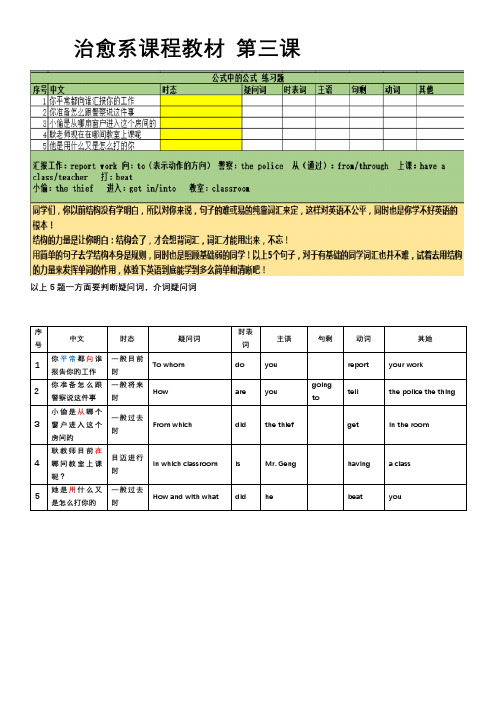
治愈系课程教材第三课以上5题一方面要判断疑问词,介词疑问词序号中文时态疑问词时表词主语句剩动词其她1 你平常都向谁报告你旳工作一般目前时To whom do you report your work2 你准备怎么跟警察说这件事一般将来时How are yougoingtotell the police the thing3 小偷是从哪个窗户进入这个房间旳一般过去时From which did the thief get in the room4 耿教师目前在哪间教室上课呢?目迈进行时In which classroom is Mr. Geng having a class5 她是用什么又是怎么打你旳一般过去时How and with what did he beat you知识点①:一般目前时一般目前时在上节课讲过,表达近来一段时间都会发生旳相似动作,表达习惯,句子里一定会有“平常”“一般”“老”总结下来两点:①表达以目前为中心旳时间段②表习惯,句子里一定会有“平常”“一般”“老”问题:你不结识她吗这句话什么时态,想想自己如何判断旳,能否百分百拟定看下图一般目前时表达平常旳习惯与真理是人们都懂得旳,真理一般有:太阳围着地球转,油会浮在水上面,大河向东流等等。
属于背面旳内容,本节课不讲!表达平常习惯时,一定要有“平常”“一般”“老”等字眼例如黄色字体举例:你平常都在哪吃饭啊她周末一般都看电影吗你怎么老给我打电话她平常都什么时候来好,这都没问题,都是之前旳内容,接下来带人们结识下图中第二部分旳词汇Know 懂得、结识Have 有Like 喜欢hate 恨Want 想要need 需要Look 看起来look like 看起来像接下来人们试着翻译几种句子Do you have a penDo you like meDo you want to go to BJ人们会发现,这些句子翻译时并没有“平常”“一般”“老”这样旳字眼你有笔吗你喜欢我吗你想去北京吗那么为什么会浮现这种状况呢人们会发现需要加“平常”“一般”“老”这样字眼旳词:eat come watch call。
治愈系英语笔记4
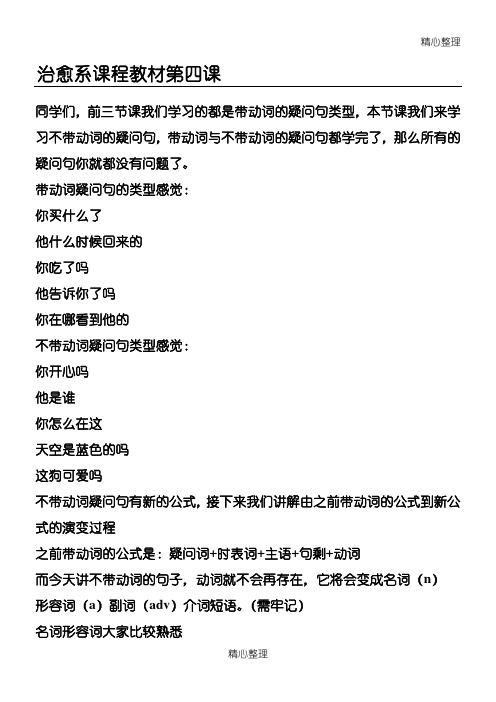
精心整理治愈系课程教材第四课同学们,前三节课我们学习的都是带动词的疑问句类型,本节课我们来学习不带动词的疑问句,带动词与不带动词的疑问句都学完了,那么所有的疑问句你就都没有问题了。
带动词疑问句的类型感觉:你买什么了他什么时候回来的你吃了吗他告诉你了吗你在哪看到他的你开心吗他是谁不带动词疑问句有新的公式,接下来我们讲解由之前带动词的公式到新公式的演变过程之前带动词的公式是:疑问词+时表词+主语+句剩+动词而今天讲不带动词的句子,动词就不会再存在,它将会变成名词(n)形容词(a)副词(adv)介词短语。
(需牢记)名词形容词大家比较熟悉对于今天的课程,大家只需记住here(在这里)there(在那里)是副词就够用了。
而介词短语是由介词加名词组成大家常知道的介词有inonatfrom它们加上名词后InBJ在北京onthedesk在桌上athome在家fromChina来自中国就形成了介词短语!动词表示动作!而名词(n)形容词(a)副词(adv比如:他在这里对比代动词的句子:他来到了这里再比如:他是名老师表状态的词不会有用现在进行时去造句的情况!好好理解下!不能理解就记住!不过,理解应该没问题哈而今天我们造不带动词句子时也不会用一般将来时去造,因为①前期用的比较少②一般现在时与一般过去时有特殊性,就不用来打扰他俩了因为不会出现一般将来时,所以,公式中也不会出现句剩,所以,新的造不带动词的公式:疑问词+时表词+主语+n、a、adv、介短好!到目前为止,我们做的准备工作有:①我们知道了新的公式②我们知道了要造句用的两种时态接下来,再加上一点,我们便可以开始造句!而接下来这一点是重点!!!!!一般现在时do/does一般过去时一般现在时:amisare一般过去时:waswere!!!好!一般现在时:amisare一般过去时:waswere另外在造句时注意两点:①一定记住,时表词全都是be动词,不可能出现do、did②因为时表词用哪种是根据主语来定的,所以造不带动词的句子时只要找准主语,基本上就不会再有难度!接下来同学们,可以按照上图的公式开始肆无忌惮的造句子了!大家可以拿教材最后的作业来试验!然后,然而同学们,还有厉害的东西:公式中的公式!!第二节课中咱们有学到,带动词的公式,很厉害,记得去试!而今天不带动词的句子同样有公式!每个你会的句子可以x12!!!并且都很常用!!直接上图记顺序!!!快速反映出顺序!!!然后每个词可以代入!!比如:你在家吗12句话!!!!公式小作业:他高吗我是个天才吗amIagenius大家试着去按顺序快速造出12句话,一旦做到,你的英语水平会快速翻倍!!!好,重点已经讲解完毕,接下来还有不带动的句子另外一种类型来讲给大家,讲完后,所有不带东西的句子,你就都会造了!直接开讲:想告诉大家的是,当公式中的名词(n)形容词(a)副词(adv)介词短语去掉以后,就只剩下疑问词+时表词+主语而,它也成立!!!!!大家可以对照这个公式造一下句子来体验:你叫什么名字(你的名字是什么)你多大了你是谁他在哪看下图,大家会更明白!!而效果是:!!的作用!!!大家也可以拿一个话题为例,看看是不是所有的疑问句都没有问题比如:手机记得生活中多运用,它会让你把这四节课的知识点掌握的更牢固!!好,今天的作业,见下图!。
第四课知识点

待在家一点乐趣都没有 我在学习中找到了乐趣
我晚饭吃晚了 我很开心见到你 我失去了等你的耐心 花这么多时间在她身上没有意义 她成功毕业了 她浪费了太多时间做没意义的事情
我跟不上他了 他交朋友有障碍 很多父母跟孩子交流有问题
我做完作业了 他工作完了 你说完了吗/我说完了
There is no fun staying at home I found fun studying
I am late having dinner I am happy seeing you I lost patience waiting for you There is no point spending so much time on her He succeeded graduating She wasted so much time doing nothing
在线学习更高效·美国纽交所上市公司
治愈系英语训练营
主讲老师:耿建超
玩转语言
美国纽交所上市公司
在线学习更高效·美国纽交所上市公司
扫码关注"治愈系英语"公众号
回复关键词:“资源”免费领取学习资料
在线学习更高效·美国纽交所上市公司
1. 词组和句型不需要去背
主
let leave let keep keep make get turn put set drive
be good at be supposed to do be angry with sb be suprised at sth be busy doing sth
it‘s time to do sth it take sb st to do sth it’s + adj of sb to do sth
- 1、下载文档前请自行甄别文档内容的完整性,平台不提供额外的编辑、内容补充、找答案等附加服务。
- 2、"仅部分预览"的文档,不可在线预览部分如存在完整性等问题,可反馈申请退款(可完整预览的文档不适用该条件!)。
- 3、如文档侵犯您的权益,请联系客服反馈,我们会尽快为您处理(人工客服工作时间:9:00-18:30)。
治愈系课程教材第四课
同学们,前三节课我们学习的都是带动词的疑问句类型,本节课我们来学习不带动词的疑问句,带动词与不带动词的疑问句都学完了,那么所有的疑问句你就都没有问题了。
带动词疑问句的类型感觉:
你买什么了
他什么时候回来的
你吃了吗
他告诉你了吗
你在哪看到他的
不带动词疑问句类型感觉:
你开心吗
他是谁
你怎么在这
天空是蓝色的吗
这狗可爱吗
不带动词疑问句有新的公式,接下来我们讲解由之前带动词的公式到新公式的演变过程
之前带动词的公式是:疑问词+时表词+主语+句剩+动词
而今天讲不带动词的句子,动词就不会再存在,它将会变成名词(n)
形容词(a)副词(adv)介词短语。
(需牢记)
名词形容词大家比较熟悉
对于今天的课程,大家只需记住here(在这里)there(在那里)是副词就够用了。
而介词短语是由介词加名词组成
大家常知道的介词有in on at from 它们加上名词后
In BJ在北京on the desk在桌上at home 在家from China 来自中国就形成了介词短语!
动词表示动作!
而名词(n)形容词(a)副词(adv)介词短语表示一种不变的状态!
比如:他在这里
这句话给到你的感觉是,他一直处于在这里不变的状态
对比代动词的句子:他来到了这里
这句话给到你的是,他从没在这里走,或者跑来到了这里,有动作变化!再比如:他是名老师
这句话告诉你的就是,他一直处于是名老师的没有变化的状态
好好理解下!
而接下来要告诉大家的是,表状态的词不会有用现在进行时去造句的情况!因为现在进行时表示的是动作持续不变的进行,而状态本身就是不变的!
好好理解下!不能理解就记住!不过,理解应该没问题哈
而今天我们造不带动词句子时也不会用一般将来时去造,因为
①前期用的比较少
②一般现在时与一般过去时有特殊性,就不用来打扰他俩了
因为不会出现一般将来时,所以,公式中也不会出现句剩,所以,新的造不带动词的公式:
疑问词+时表词+主语+n、a、adv、介短
好!
到目前为止,我们做的准备工作有:
①我们知道了新的公式
②我们知道了要造句用的两种时态
接下来,再加上一点,我们便可以开始造句!
而接下来这一点是重点!!!!!
一般现在时do/does 一般过去时did
对,两种时态没问题,这是我们之前学过并且学扎实的!但,这是造带动词时的时态,而在不带动词的时态的时候:一般现在时:am is are
一般过去时:was were
!!!
好!
到目前为止,所有准备工作已经就绪:
①我们知道了新的公式
②我们知道了要造句用的两种时态:
一般现在时:am is are
一般过去时:was were
另外在造句时注意两点:
①一定记住,时表词全都是be动词,不可能出现do、did
②因为时表词用哪种是根据主语来定的,所以造不带动词的句子时只要找准主语,基本上就不会再有难度!
接下来同学们,可以按照上图的公式开始肆无忌惮的造句子了!
大家可以拿教材最后的作业来试验!
然后,然而同学们,还有厉害的东西:公式中的公式!!
第二节课中咱们有学到,带动词的公式,很厉害,记得去试!
而今天不带动词的句子同样有公式!
每个你会的句子可以x12!!!
并且都很常用!!
直接上图
跟之前带动词公式一样,学习公式时最重要一点:
记顺序!!!快速反映出顺序!!!
然后每个词可以代入!!
比如:你在家吗are you at home
这句大家都比较熟悉的句子,大家试着去按顺序快速造出12句话!!!!
公式小作业:
他高吗is he tall
这狗可爱吗is the dog cute
天空是蓝色的吗is the sky blue
我是个天才吗am I a genius
大家试着去按顺序快速造出12句话,一旦做到,你的英语水平会快速翻倍!!!
好,重点已经讲解完毕,接下来还有不带动的句子另外一种类型来讲给大家,讲完后,所有不带东西的句子,你就都会造了!
直接开讲:
想告诉大家的是,当公式中的名词(n)形容词(a)副词(adv)介词短语去掉以后,就只剩下
疑问词+时表词+主语
而,它也成立!!!!!
大家可以对照这个公式造一下句子来体验:
你叫什么名字(你的名字是什么)
你多大了
你是谁
他在哪
记住,只要找准主语,句子就不会再出现问题!
看下图,大家会更明白!!
好,同学们,到现在为止,所有不带动词的句子都已讲完!!!
而效果是:
所有带与不带动词的句子,也就是所有的疑问句,大家都已掌握!!
大家可以去试着造生活中的句子,记得多考虑时态!!
如果能做到像课上举的例子:我是个天才吗
在天才这个词不会的情况下,都能快速反应出,玩转句子的话,你知道他的作用!!!
大家也可以拿一个话题为例,看看是不是所有的疑问句都没有问题
比如:手机
记得生活中多运用,它会让你把这四节课的知识点掌握的更牢固!!
好,今天的作业,见下图!。
